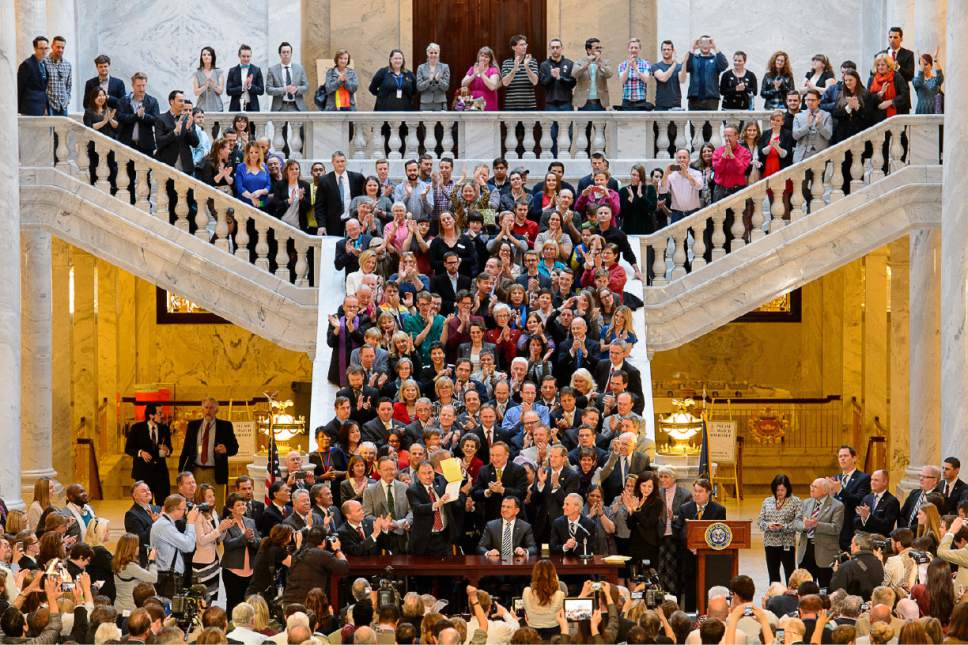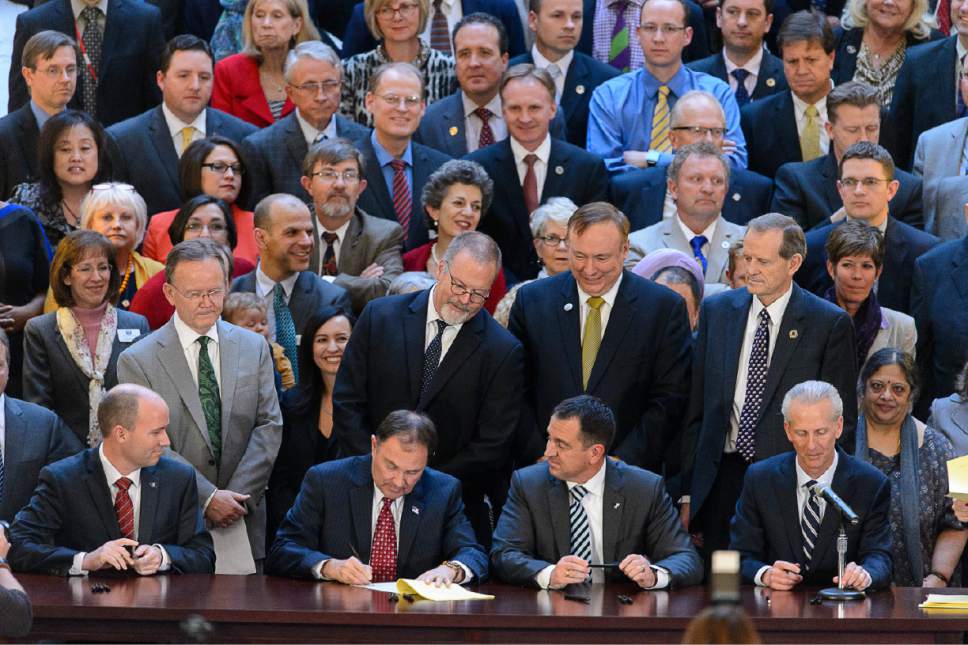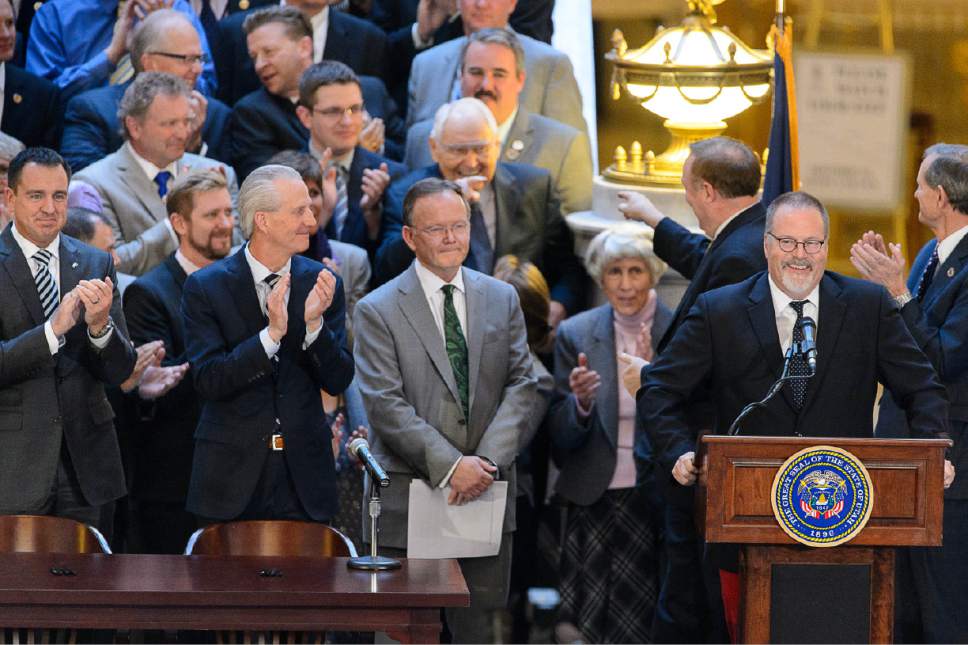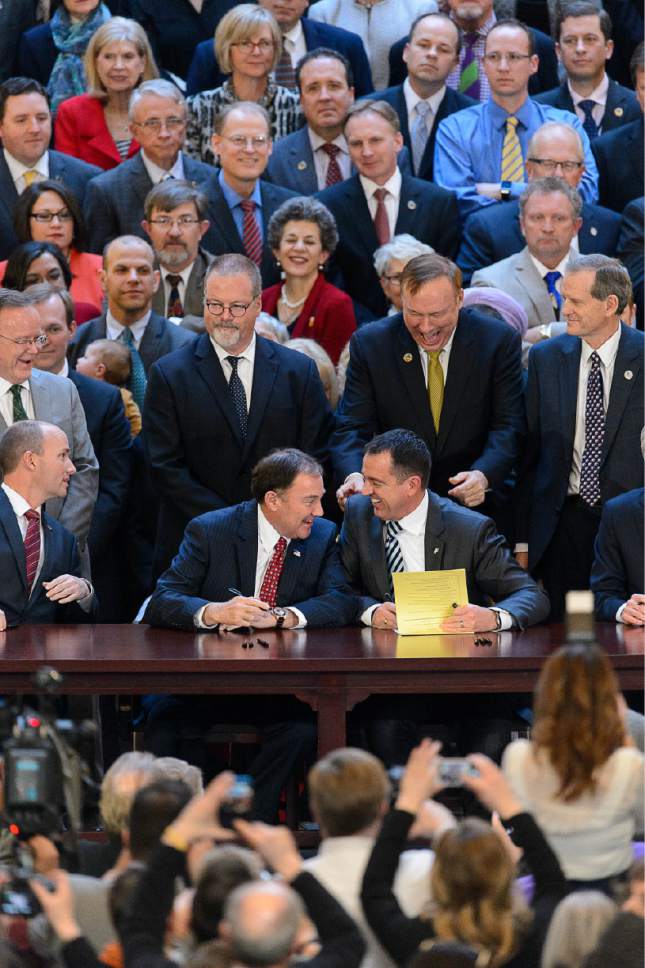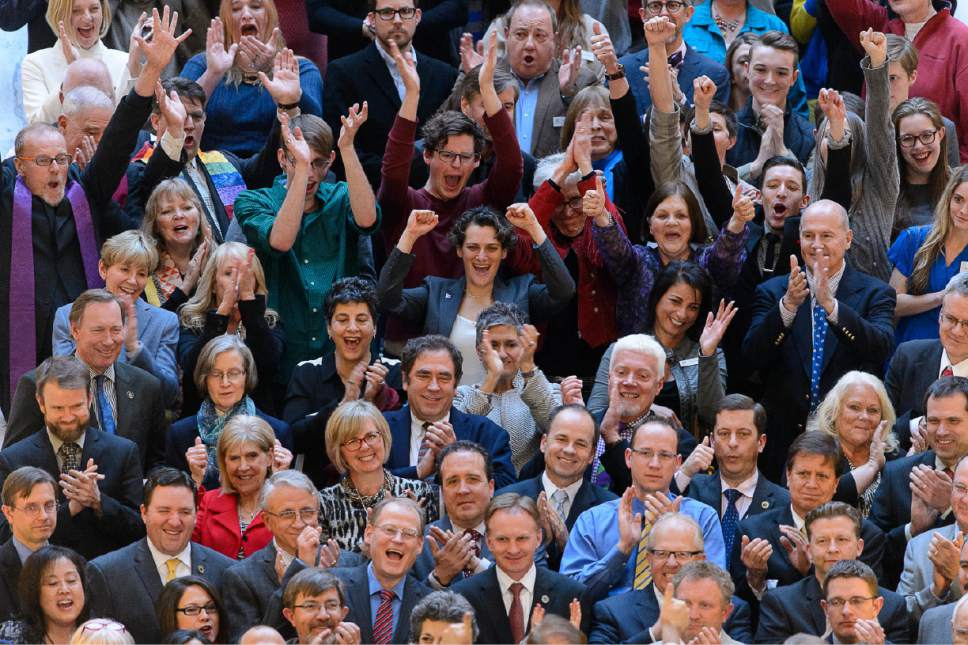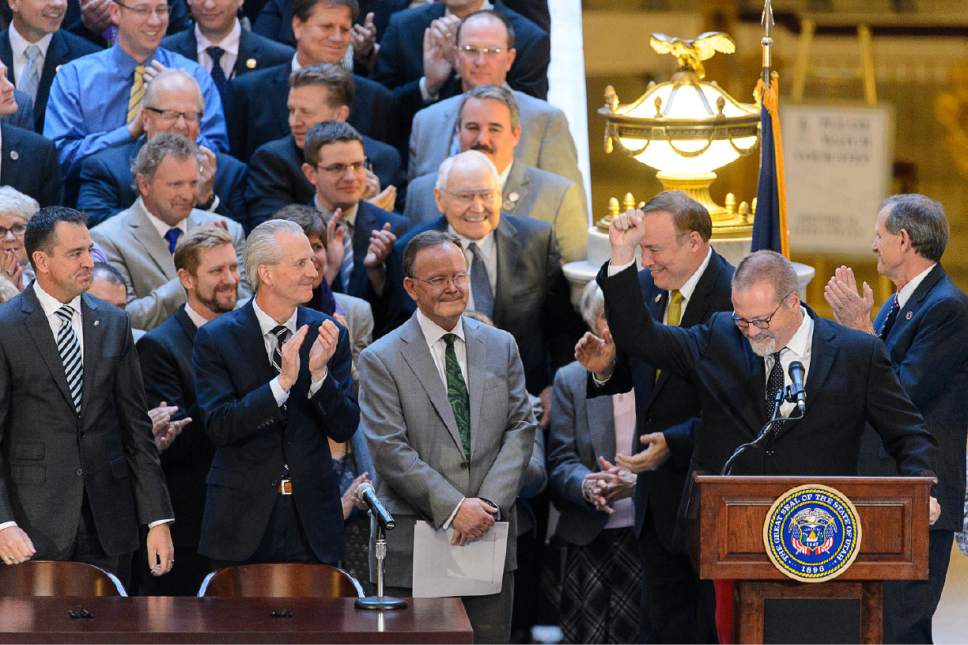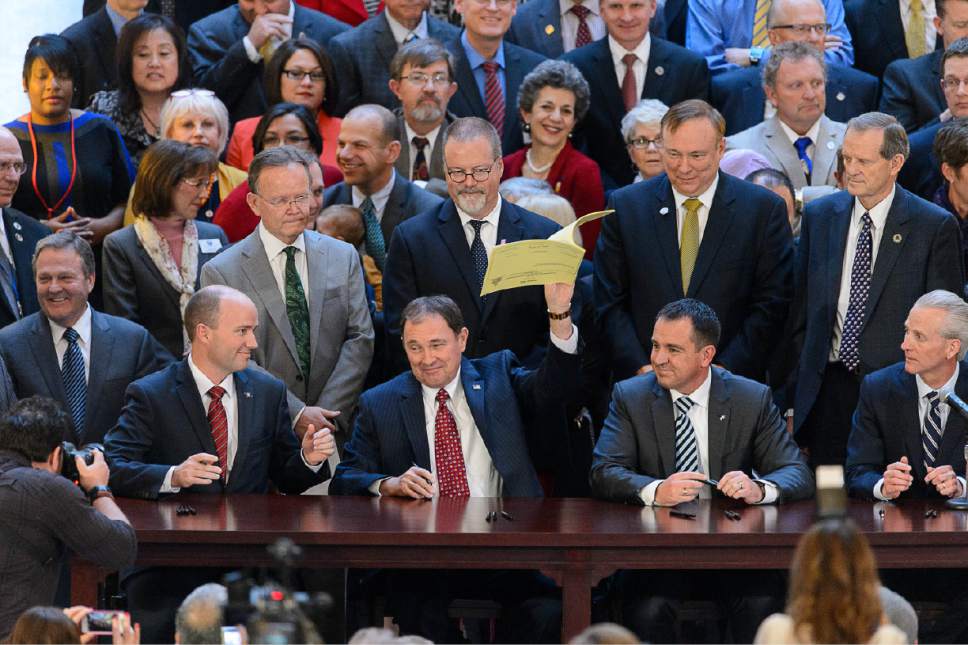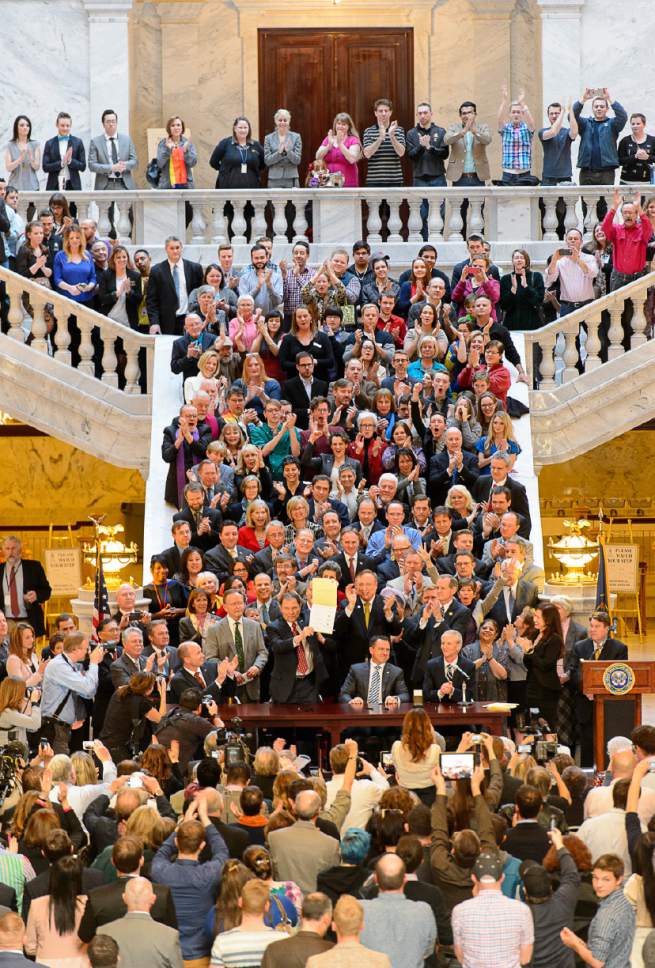This is an archived article that was published on sltrib.com in 2015, and information in the article may be outdated. It is provided only for personal research purposes and may not be reprinted.
The balance between religious freedom and gay and transgender rights has dominated the headlines as lawmakers in Arkansas and Indiana passed bills that some said gave people of faith license to discriminate.
The rancorous uproar that followed — rallies, criticisms from corporate giants Apple, Eli Lilly and Wal-Mart, along with an avalanche of scoldings from both conservatives and gay activists — left both states feeling bruised and scrambling to rewrite their legislation.
It's a far cry from the scene that played out in Utah last month, when lawmakers, Mormon church authorities and leaders of the lesbian, gay, bisexual and transgender community were celebrated for passing SB296, a law which marries nondiscrimination protections for the LGBT community with safeguards for religious organizations and their affiliates.
So what's different?
"The simple answer is that Utah did not pass a RFRA," said Troy Williams, executive director of Equality Utah. "Utah passed a law that protects people of faith and gay and transgender Utahns from discrimination in housing and employment. That's very different."
RFRA is short for Religious Freedom Restoration Act, legislation which is designed to ensure that religious-liberty interests are protected. A federal RFRA, pronounced "riff-ruh," cleared Congress in 1993. It requires government to accommodate an individual's religious beliefs, unless there is a compelling interest at stake.
Under a 1997 U.S. Supreme Court ruling, the law cannot be applied to states, so, in 1999, states began adopting their own RFRA laws. To date, 21 states have enacted RFRAs, including Indiana and Arkansas.
As they have most often been used, RFRAs can provide important protections for people of faith, said Marina Lowe, legislative and policy counsel for Utah's American Civil Liberties Union chapter. A Muslim denied the right to wear a headscarf, for example, would be shielded under a RFRA and would have grounds to sue.
"It's this idea that the government can't burden your ability to practice your religion, or shouldn't, unless there is a compelling interest," Lowe said. "Public safety, for example, might be a compelling interest."
Utah has no RFRA law on the books, but might have if state lawmakers had passed HB322, a proposal from Rep. LaVar Christensen, R-Draper, which sought to grant wide protections for religious conscience and would have allowed individuals to use religious freedom as a defense in discrimination lawsuits.
House lawmakers passed the bill, but it failed in the Senate in the final hours of the legislative session.
HB322's intent mirrored the current national trend to extend RFRA safeguards to private individuals, Lowe said. Its protections were potentially so broad that Lowe called it "worse than Indiana's" original proposal.
"When a religious-freedom law starts being used almost as a sword to go against somebody's civil rights," Lowe said, "that's when we have a problem."
On Thursday, Indiana and Arkansas passed retooled versions of their respective RFRA proposals, The Associated Press reported.
Arkansas' revised measure resembles the federal RFRA and addresses actions only by the government, not those of individuals or businesses.
Indiana's revised measure prohibits businesses or service providers from using the law as a defense for refusing goods or services. It also bars discrimination based on a number of classifications, including race, color, religion, ancestry age, disability, sexual orientation and gender identity.
The Indiana law exempts churches, affiliated religious schools and nonprofit religious organizations from its rules, the AP reported.
Utah's SB296 has different and more specific goals than the laws passed by Arkansas and Indiana, although it also makes concessions to religious organizations.
SB296 amended Utah's existing nondiscrimination laws for housing and employment to include protections based on sexual orientation and gender identity, making it illegal for employers or landlords to use those categories as the basis for discrimination.
Religious organizations and their affiliates, along with the Boy Scouts of America, would be exempt from those requirements. In addition, the new law prevents workers from being fired for expressing beliefs on marriage, family or sexuality unless they conflict with the employer's business interests.
With SB296's passage, Utah became the 19th state to provide statewide protections for gay and transgender persons in employment and housing.
Some have touted Utah's approach and its religious exemptions as a model for the rest of the nation, but that's an apples-to-oranges comparison, Williams said.
"People think that a RFRA is similar to a religious exemption," he said, "but that's not accurate."
Additionally, many of the exemptions in SB296 aren't new, but were already included in existing housing and discrimination law and reflect Utah's unique landscape, where religion is deeply entwined with the state's culture.
"Utah has among the broadest religious exemptions in the country, and you would never want to cut and paste it," Williams said. "That's why SB296 is a milestone for Utah, but not a model for the country."
It is a step, however, that won praise from President Barack Obama during his brief stay in the Beehive State last week.
During a meeting with top leaders of The Church of Jesus Christ of Latter-day Saints, according to an LDS news release, Obama "expressed his appreciation for the church's leadership role in seeking a balance between religious freedom and nondiscrimination."


